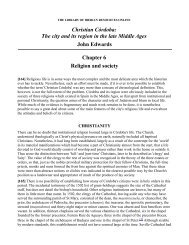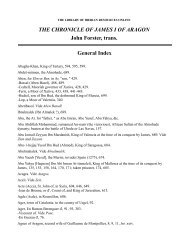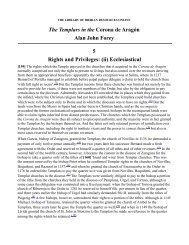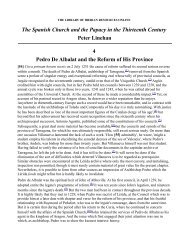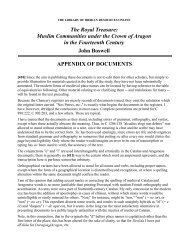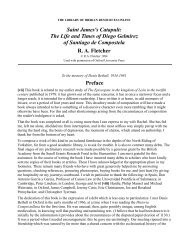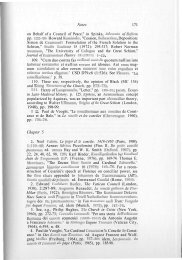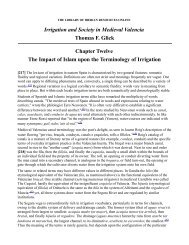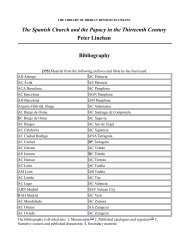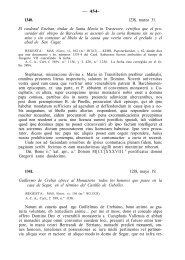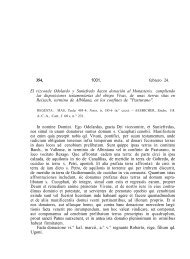PROTESTANTISM - The Library of Iberian Resources Online
PROTESTANTISM - The Library of Iberian Resources Online
PROTESTANTISM - The Library of Iberian Resources Online
You also want an ePaper? Increase the reach of your titles
YUMPU automatically turns print PDFs into web optimized ePapers that Google loves.
could not fail to prejudice Vergara's case, which dragged on, in spite <strong>of</strong> the efforts <strong>of</strong> his friends, and<br />
even <strong>of</strong> the empress, to expedite it. At length, on December 21, 1535, he was sentenced to appear as a<br />
penitent in an auto de fe, to abjure de vehementi, to be recluded in a monastery for a year irremissibly,<br />
and to pay a fine <strong>of</strong> fifteen hundred ducats. In three months, however, Manrique charitably transferred<br />
him to the cathedral cloister and, on February 27, 1537, his confinement came to an end. (8) He incurred<br />
no disabilities; his reputation seems not to have suffered, for he retained his Toledo canonry and, as we<br />
have seen, he incurred, in 1547, the displeasure <strong>of</strong> Archbishop Silicio by opposing the statute <strong>of</strong><br />
limpieza.<br />
Virués was a similar victim to the revulsion against Erasmus. He was Benedictine Abbot <strong>of</strong> San Zoilo,<br />
a learned orientalist and the favorite preacher <strong>of</strong> Charles V, who had carried him to Germany. Envy <strong>of</strong><br />
his favor at court caused his denunciation; isolated passages in his sermons were cited against him, and<br />
he was thrown in prison in 1533. His incarceration lasted for four years, in spite <strong>of</strong> Charles's efforts for<br />
his liberation; it was in vain that he pleaded that, some fourteen years before, Erasmus had been<br />
regarded as orthodox, and that he adduced the arguments which he had used against Melanchthon in the<br />
Diet <strong>of</strong> Ratisbon. In 1537, he was declared to be suspect <strong>of</strong> Lutheranism, he was required to abjure and<br />
was recluded in a convent for two years, with suspension from preaching for two more. Charles was so<br />
much interested in him that, notwithstanding his strenuous objection to papal interference, he procured<br />
from Paul III a brief <strong>of</strong> May 29, 1538, by which the sentence was set aside and Virués was declared<br />
capable <strong>of</strong> any preferment, even episcopal. When [419] Juan de Sarvia, Bishop <strong>of</strong> Canaries, died in<br />
1542, Virués was appointed his successor and died in 1545. (9)<br />
Contemporary with these cases was that <strong>of</strong> Pedro de Lerma, a member <strong>of</strong> one <strong>of</strong> the leading families <strong>of</strong><br />
Burgos. He was a canon <strong>of</strong> the Cathedral and Abbot <strong>of</strong> Alcalá, renowned as a preacher and a man <strong>of</strong> the<br />
highest consideration. He had spent fifty years in the University <strong>of</strong> Paris, where the Sorbonne made<br />
him dean <strong>of</strong> its faculty. Happening to read some <strong>of</strong> the works <strong>of</strong> Erasmus, he was so impressed that<br />
they influenced his sermons. He was denounced to the Inquisition, which imprisoned him and, after a<br />
long trial he was required, in 1537, to recant eleven propositions publicly in all the towns where he had<br />
preached, confessing that he had taught them at the instigation <strong>of</strong> the devil to propagate error in the<br />
Church. He was so humiliated that he abandoned Spain for Paris, where he was warmly received as<br />
dean <strong>of</strong> the faculty, and where he died in 1541. <strong>The</strong> people <strong>of</strong> Burgos, we are told, who had regarded<br />
him with the greatest reverence, were so impressed by this that those who had sent their sons abroad to<br />
study at once recalled them. (10)<br />
This atmosphere <strong>of</strong> all-pervading suspicion, and this exaggerated sensitiveness to possible error,<br />
exposed everyone to prosecution for the most innocently unguarded remark. Miguel Mezquita, a<br />
gentleman <strong>of</strong> Formiche (Teruel) appeared January 19, 1536, before the Valencia tribunal in obedience<br />
to a citation and, under the usual formula <strong>of</strong> being told to search his conscience, he intuitively recurred<br />
to Erasmus and related a talk which he had, some five or six years previous, with a Dominican, in<br />
which he had defended the Enchiridion on the ground that it had been subjected to examination without<br />
being condemned. This however proved not to be the cause <strong>of</strong> his summons, for Pedro Forrer, a priest<br />
<strong>of</strong> Teruel, had denounced him as having said that Luther preached the gospel and was therefore called<br />
an evangelist, while the followers <strong>of</strong> the pope were called papists, and that Luther was right in<br />
maintaining that Scripture did not say that Christ gave power to St. Peter, but to all the apostles.<br />
Mezquita explained that he had been several times to Italy and had been sent to [420] Flanders; the<br />
priest had asked him what was said about Luther, and he had merely gratified his curiosity by repeating<br />
what he had heard abroad in common talk. He earnestly implored to be released, for he had eight<br />
children, four <strong>of</strong> them studying in Salamanca and, when suddenly carried <strong>of</strong>f from home, he had left



